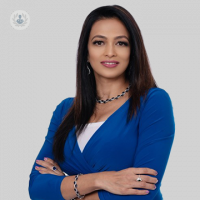How can psychiatry help children and adolescents handle anxiety?
Written in association with:Anxiety can take many shapes and forms, and its impact on young children and adolescents can be debilitating to their self-confidence and their relationships throughout their whole lives. Dr Ramya Mohan, leading child and adolescent psychiatrist, sheds more light on the condition in this article.

The benefits of child and adolescent psychiatry in managing anxiety
Child and adolescent psychiatry is a speciality that focuses on the mental health of young people, offering support to children and teenagers as they undergo behavioural and emotional challenges. Although anxiety is to be expected during this turbulent part in the process of growing up, this emotional state can overwhelm and interfere with a child's ability to engage with the world around them. Fortunately, through the tailored approach of child and adolescent psychiatry, children can learn how to manage their anxiety effectively, helping them lead healthier and more balanced lives.
Understanding anxiety in children and adolescents
Anxiety is often characterised by feelings of worry, fear, or unease. For children and adolescents, this might manifest as difficulty sleeping, irritability, changes to social behaviours, or avoidance of school. While it is normal to experience anxiety in certain situations, like before a test or meeting new people, some children face more persistent and intense forms that affect their daily functioning. This can lead to long-term difficulties if not addressed early. Children may not always be able to articulate what they are feeling, which can make identifying anxiety more challenging. This is where the expertise of a child and adolescent psychiatrist is most beneficial. These professionals are trained to recognise the subtle signs of anxiety in young people, using various diagnostic tools and therapeutic approaches to address both the emotional and physical symptoms.
The role of child and adolescent psychiatry
One of the main benefits of child and adolescent psychiatry is the empathetic, individualised care it offers. Psychiatrists specialising in this field are well-versed in developmental psychology, which allows them to understand the unique changes children face as they grow, with consideration to factors such as the child's age, environment, family dynamics, and personal history.
For children experiencing anxiety, psychiatrists work to identify the underlying causes, which may range from academic pressures, to family issues, to genetic predispositions, or even other neurological conditions. Through assessment, they can pinpoint specific anxiety disorders, such as generalised anxiety disorder, social anxiety, or panic disorders, and develop an appropriate treatment plan. Child and adolescent psychiatry helps to provide children the tools to maintain their mental health from these early years and into adulthood.
What are some approaches to managing anxiety?
A child psychiatrist may recommend several types of interventions depending on the severity and nature of the anxiety. Cognitive-behavioural therapy (CBT) is one of the most commonly used approaches. CBT helps children understand their anxious thoughts and teaches them practical techniques to cope with stress and anxiety-provoking situations. It empowers them to replace negative thought patterns with more balanced and rational ones, providing long-term resilience.
In some cases, medication may be considered to help manage severe symptoms. When prescribed by a trained psychiatrist, medications such as selective serotonin reuptake inhibitors (SSRIs) can help regulate mood and reduce anxiety levels, making it easier for children to engage with therapy, school, and everyday activities.
Family involvement is another critical aspect of treatment. Often, family therapy is incorporated to ensure that parents and caregivers understand how to support their child. This may involve teaching them how to create a calming environment at home, reduce stress triggers, and communicate effectively with their child about their feelings.
What are the long-term benefits of psychiatric treatment for anxiety in children and adolescents?
The work of child and adolescent psychiatry extends beyond managing immediate symptoms. By addressing anxiety early, psychiatrists help prevent the development of more serious mental health issues later in life. Children who receive proper care are more likely to develop healthy coping mechanisms, improve their emotional regulation, and build stronger relationships.
In conclusion, the specialised field of child and adolescent psychiatry plays a vital role in helping young people navigate the challenges of anxiety. Through a combination of therapy, medication, and family support, psychiatrists provide children with the tools they need to manage their anxiety and lead fulfilling lives.
If you are seeking treatment for your child or teenager suffering from anxiety or other mental health issues, you can book with one of Central London’s leading child and adolescent psychiatrists, Dr Ramya Mohan, on her Top Doctors profile.


